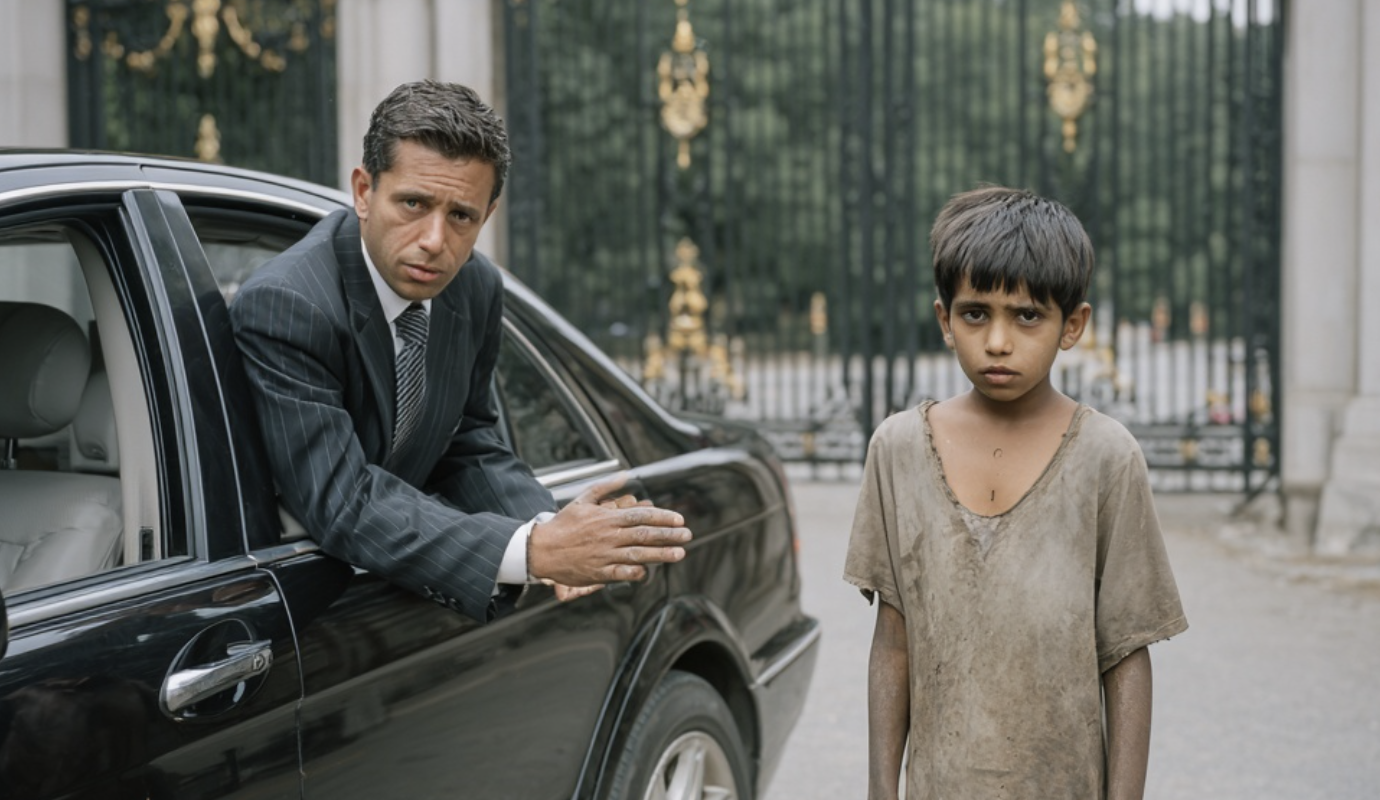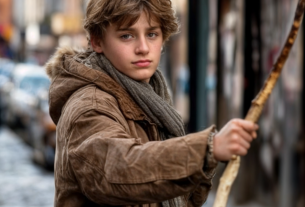“The Boy on Fifth Avenue”
The sun had only begun to nick the edges of Manhattan’s towers when Alejandro Vargas stepped out of his Fifth Avenue building. Madrid was a lifetime behind him now; here he was Alejandro-the-mogul—deals, press, a glassy S-Class idling at the curb. In an hour he’d be pitching a billion-dollar Miami development. He tugged his cuff, reached for the rear door—and a voice shattered the morning hum.
“Don’t start the car. Your wife cut the brakes.”
Alejandro looked up. A boy stood near the streetlight—fifteen, maybe—wearing a hoodie two sizes too big and a winter’s worth of city dust. The words hung there, absurd and razor-sharp at once. People streamed around them, faces set toward work, not one of them slowing.
“What did you say?” Alejandro asked, lowering his sunglasses.
“I saw her,” the boy said, voice shaking but steady. “Last night. She was under your hood. Pliers. She cut a line. Please—don’t drive.”
Isabella. A tabloid-perfect wife with impossible cheekbones and the glare of someone who’d never been told no. Three weeks ago he’d filed for divorce. She’d promised he would regret it. Alejandro had dismissed it as theater.
His hand fell from the door handle.
“Show me,” he said.
The boy—Ethan—led him to the rear of the car and pointed beneath the chassis. There, just visible through a smear of oily dust, a line dangled like a severed vein.
The brake line.
Alejandro’s stomach dropped through the concrete. He waved off his chauffeur and called a mechanic he trusted with his life and his cars. Ten minutes later, the verdict came crisp and cold: the line had been cleanly cut. One hard stop and the pedal would have gone to the floor.
Fear arrived first. Rage followed a half-step behind.
“Go to the police,” the chauffeur said, already reaching for his phone.
Ethan grabbed Alejandro’s sleeve. “If she did it, she’ll deny it. People like that always have lawyers ready. You need proof.”
Alejandro heard the steel in the boy’s voice and recognized it. Survival. It had carried Alejandro across an ocean at twenty-two. It had kept him from going under when his first New York deal imploded. It was the one thing that didn’t lie.
“All right,” Alejandro said. “Then we get proof.”
The Trap
He kept his face neutral that evening as he walked into the Greenwich mansion. Isabella glided toward him in silk, poured him a glass of something aged and expensive, and kissed the air near his cheek.
“Tough day, cariño?” she purred. The accent made everything sound like a lullaby.
“Just numbers,” he said, forcing a smile.
While she scrolled her phone in the living room, he replaced the car in the garage and installed pinhole cameras: one above the tool bench, one by the overhead rack, one with a clean view of the rear axle. He linked them to a cloud account under an employee’s name. Back in the city, Ethan agreed to keep an eye on the Fifth Avenue garage. For his trouble Alejandro pressed cash into his palm and, when the boy balked, closed Ethan’s fingers around it.
“Food first,” he said. “Then proof.”
Two nights passed quietly. On the third, at 1:17 a.m., a sensor tripped.
The garage feed flickered to life: Isabella, hair tied back, gloves on, a small roll-up kit in her hand. Calm as a surgeon, she crouched the way Ethan had described, checked the brake line she’d maimed, and tugged at it as though testing a knot. She didn’t notice the eye above her.
Alejandro watched the footage twice. Then he slept two hours he didn’t remember.
In the morning, he waited in the kitchen. When Isabella entered, her gaze slid from his coffee to the phone in his outstretched hand.
“What’s this?” she asked, affecting boredom.
“Insurance,” he said, pressing play.
Her face drained. Fury flooded in to replace the color. “You were going to ruin me,” she hissed. “Walk away and leave me with scraps. I won’t be thrown out like trash—”
“You tried to kill me,” Alejandro said, flat. “That’s not divorce. That’s a felony.”
She moved for the phone. He stepped back and nodded once to the private security officer he’d hired at dawn. The officer didn’t touch Isabella; he only stood where the door used to be an exit.
Alejandro sent the footage to his lawyer, then to the police. The arrest was quiet and civilized, the way wealth makes ugly things look palatable. By lunchtime, push alerts were strobing on strangers’ screens: MILLIONAIRE’S WIFE ARRESTED IN BRAKE SABOTAGE. The anchor smiles were tight with awe.
The Boy Who Spoke Up
If the headlines loved the fall of a socialite even more than the salvation of a businessman, they loved the unexpected witness most of all. A homeless kid no one had looked at twice had seen what the cameras hadn’t been there to catch the first time and had cared enough to say something.
Alejandro tracked Ethan to the cafeteria of a youth drop-in center two avenues over. The boy was eating like someone might take the plate away.
“I owe you more than a thank-you,” Alejandro said, sitting down.
“You don’t owe me anything,” Ethan muttered. “I just… I couldn’t let someone die.”
Alejandro slid a folder across the table: a placement at a reputable youth shelter, a prepaid phone, a doctor’s appointment, an ID application filed, and—because the boy had an edge sharpened by hunger—a line about a future: school, then maybe an internship, if he wanted it.
“Take it,” Alejandro said. “Or don’t. Your choice. But don’t tell me I owe you nothing.”
Ethan stared at the folder for a long time, then nodded once. It was the smallest movement Alejandro had ever seen carry so much weight.
Aftermath
Weeks later, outside the courthouse, the chill had shifted from winter to the first suggestion of spring. Reporters crowded the steps, hungry for a statement. Alejandro ignored them.
Ethan stood beside him in a clean jacket and shoes that actually fit. The boy looked older, less like prey.
“You saved my life,” Alejandro said, meaning every syllable.
Ethan’s mouth tipped into something almost like a smile. “Maybe you just needed someone to tell you the truth when nobody else would.”
Alejandro thought of all the rooms he’d sat in where truth had been whatever the richest person said it was. He put a hand on the kid’s shoulder.
“Then don’t stop doing that,” he said. “Not for anyone.”
They walked down the steps into a city that, for once, had paused to listen to the right voice. Somewhere upriver, the morning light broke the surface of the glass towers again. Deals would be made; headlines would roll on. But for Alejandro, there would always be a before and after divided by a single warning on a gray Manhattan morning:
“Don’t start the car.”



